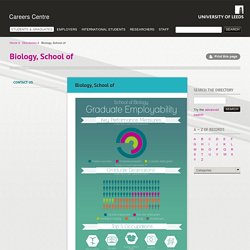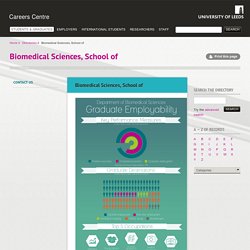

Bioinformatics. Microbiology. Sport and Exercise Science. Biology, School of. Biology, School of Key measures: Positive Outcomes: 94.9%, Graduate prospects: 75.3%, Graduate employment: 67%

Downloads. Downloads. What can I do with a biology degree? Biology degree career options. There are plenty of careers available to biology students, but since there isn’t a single obvious path, sometimes it can be problematic deciding what to do after graduating.

This guide should help you think about the skills you have, the jobs they can be applied to, and the options available. Specific skills you will have gained include: Featured Job - Work Experience. Careers. Biology offers a wide range of career options and opportunities for school-leavers, graduates, postgraduates.

Whichever stage of your career you're at - from deciding whether to study biology at school, college or university, to working out what to do after you graduate - the Society of Biology is here to help. First of all, there's no such thing as a typical biologist. BiologicalSciences Non lab based 2017 for VLE. Biocareers. Home - Into Biology. Microbiology Jobs. BiologicalSciences. Leeds University Library /All Locations. New Scientist Careers Special edition. Biomedical Sciences, School of. Biomedical Sciences, School of Key measures:

What can I do with a biomedical sciences degree? Find out how you can use the skills gained on a biomedical sciences degree to embark on a range of scientific research careers, discovering vital medical developments and improving the lives of others… Job options Jobs directly related to your degree include: Jobs where your degree would be useful include: Remember that many employers accept applications from graduates with any degree subject, so don't restrict your thinking to the jobs listed here.

What can I do with a pharmacology degree? A degree in pharmacology provides a solid grounding in scientific knowledge and opens up opportunities in a wide range of careers Job options Jobs directly related to your degree include: Jobs where your degree would be useful include: Remember that many employers accept applications from graduates with any degree subject, so don't restrict your thinking to the jobs listed here.

British Pharmacological Society. What can I do with a physiology degree? What can I do with a zoology degree? As well as working as a zoologist, your in-depth knowledge of animal sciences and lab and field work equips you for a career in the environmental, agricultural and pharmaceutical industries Job options Jobs directly related to your degree include: Jobs where your degree would be useful: Remember that many employers accept applications from graduates with any degree subject, so don't restrict your thinking to the jobs listed here.

What can I do with a genetics degree? A genetics degree can lead to a career in scientific research or industry, as well as equipping you with transferable skills for a range of alternative jobs...

Job options Jobs directly related to your degree include: Jobs where your degree would be useful include: Remember that many employers accept applications from graduates with any degree subject, so don't restrict your thinking to the jobs listed here. Work experience Practical experience gained through work shadowing/experience and placements in the laboratory and field, as well as knowledge of the range of techniques used, will increase your chances of finding genetics-related work.
BioScience Careers. Next%20steps%20 %20VERSION%202%20. Spotlight on the Life Sciences A Guide to Biology Careers. Examples of jobs that can follow a bioscience degree. V2 the science at the heart of healthcare. STEM Graduates Women in STEM. Promoting opportunities, employers and events to female students and graduates Background It is widely acknowledged that STEM careers are male dominated.

Just 15% of Engineering graduates are female. The figures are 19% for Computer Studies and 38% for Maths. The shortfall is hardly surprising when we consider that 13% of the overall UK STEM workforce is female and there are relatively few female STEM role models as a consequence. Whilst we are unable to influence the subjects selected by students, we can focus our attention on ensuring that females who have opted to study a STEM degree are made aware of our services. We are keen to highlight female specific events to the STEM Graduates community and to ensure that female visitors to our site are introduced to role-models.
To find out more, please see our sister site STEM Women Resources. BCW: Biology Changing the World. Engage - The interactive research resource for bioscience undergraduates. !

This web site has been designed to help science undergraduate students with advice and assistance on the most important aspects of scientific research you'll be involved in. Whether you're interested in research in general and want more information, or you're struggling with statistical analyses, you'll find the information here. You'll also find worked examples, exercises with answers, help sheets and quick quizzes to help you gauge your understanding.
Use the main entries in the menu on the left hand side to guide you through the process of research. If you're after some quick advice on a particular aspect, such as how to write a report, check out the How Do I..? A brief note about navigation. Bioscience%20careers%20resources%20for%20undergraduates. NERT Careers in Life Sciences. STEM careers resources database.
Top 10 tips for getting a career in ecology. Careers in Ecology and Environmental Management. The Education, Training and Careers Committee supports the career development of ecologists through a variety of programmes. The BES is committed to providing expert careers advice and opportunities to ecologists at all career levels. The BES provides bursaries for A-level students on an In2Science work placement which gives students an opportunity to gain hands on experience in scientific research. The BES has established an Early Careers Working Group to provide direct insight into the contemporary needs of early career ecologists, including our student members. The Society holds an annual Undergraduate Ecological Careers Conference, which showcases a variety of career options including postgraduate study. We deliver bespoke in-house training courses to PhD students. Please also visit BES opportunities for the latest job opportunities in ecology.
Overview of the science and pharmaceuticals sector in the UK. This is one of the largest and most important industries in the UK. Find out what it's like to work in a scientific career… Environment-and-agriculture. Overview of the healthcare sector in the UK. If you are interested in caring for sick people, improving people's lives or playing a part in the next medical breakthrough, there are plenty of opportunities to consider in the healthcare sector What areas of healthcare can I work in? Employment opportunities can be grouped into: allied health (e.g. physiotherapy, radiography, occupational therapy); ambulance service; complementary therapies; dentistry; healthcare science (e.g. clinical engineering, biomedical science, pathology); health informatics; health promotion; healthcare administration and management; medicine (doctors, surgeons, GPs); medical equipment sales; pharmacy; psychological therapies; medical research; midwifery; nursing; nutrition and diet; optometry and opticians.
Health Careers. Short-guide-bioscience-degree. NERT Careers in Life Sciences. New Scientist Graduate Careers Special - 04/10/2014 digital edition. Students. UKCentreBioscience summervacationstudentships. UKCentreBioscience student competitions. Membership. British Ecological Society. You can join the British Ecological Society for as little as £21 if you are a student, retired, or a resident of a country classified as ‘low-income’ by the World Bank. Ordinary members can join from £42. Your membership will include: To make an application for membership, click this link. You can use the same link to renew an existing membership. The vision of the British Ecological Society is to advance ecology and make it count. Ecology is the scientific study of the distribution, abundance and dynamics of organisms, their interactions with other organisms and with their physical environment.
The BES’s many activities include the publication of a range of scientific literature, including five internationally renowned journals, the organisation and sponsorship of a wide variety of meetings, the funding of numerous grant schemes, education work and policy work. The Society is funded through income from subscriptions, publications and its investment portfolio. HOME. Physician associate.
Student FAQs — Faculty of Physician Associates. What Does the Training Involve? Physician Associates undergo two years full-time postgraduate training based on the Competence and Curriculum Framework for Physician Associates (DoH 2012). Explore your career options - Skills & careers. Pharmacist. Downloads. Small world: nanotech. How learned societies can help you - Into Biology. Learned Societies – a party worth joining – BioScience Careers.
Comments such as these from reports of winners of the latest round of SEB travel grants made me wonder how many researchers and PhD students are aware of these types of benefits, widely available to them in the early stages of their careers. Many academic learned societies own journals, which earn quite substantial subscription income and, as charities, they return much of this money to their members and relevant disciplinary communities. Learned societies – BioScience Careers. Learned societies are academic ‘clubs’ which specialise in a particular discipline, with a membership made up of people who share an interest in that subject. Members can include academics, university researchers, people working in industry, postgraduate and undergraduate students, teachers and even school students and members of the public. Each learned society has its own set of rules on its membership reach, fees and benefits.
There are dozens of bioscience learned societies in the world each with their own specialism. For example, the Society for Experimental Biology offers membership to animal, plant and cell biologists and limits its reach to academics, researchers and postgraduate students. The Biochemical Society, in addition to these membership categories also accepts undergraduates and teachers.
Many learned societies own journals from which they earn substantial revenue in the form of university library subscriptions, which they use to fund their activities. Societe Botanique. On-course. The European Federation of Pharmaceutical Industries and associations (EFPIA) represents the pharmaceutical industry operating in Europe. Veterinary Microbiology MSc. On this programme, you will acquire an excellent grounding in molecular biology, immunology and microbiology relevant to the study of veterinary microbiology. This will lead on to the study of the complex mechanisms of host/microbe interactions that are involved in the pathogenesis of specific animal diseases, and will provide insights into diagnosis and interventions, such as vaccines, essential for disease control. The MSc has been designed to increase your understanding and development of critical and analytical skills, such that you may identify problems, formulate hypotheses, design experiments, acquire and interpret data, and draw conclusions.